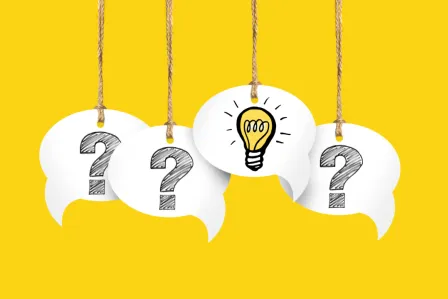The European School Education Platform shares resources and articles produced for the month of critical thinking, which took place in February 2025.

Learn how critical thinking education can help young people prepare to navigate a complex world through the articles and resources on the European School Education Platform.
Educating independent thinkers
Critical thinking plays an important role in modern democracies, especially in the digital age. The abundance of information produced by rapidly advancing technologies and diversifying media can be a challenge for young people to filter. These articles explore how integrating critical thinking into curricula can prepare pupils to navigate this world, and how schools can implement creative approaches to help pupils think critically and spot disinformation.
- Teaching critical thinking to prepare pupils for global challenges.
- Countering disinformation and conspiracy theories through education.
- Developing critical thinking on Safer Internet Day.
- The role of critical thinking in science education.
Practical approaches for teachers
Critical thinking is a key skill that students can learn through methods that encourage analytical, reflective and independent thought. In this month’s Education Talks video interview, Onno Hansen-Staszyński, Project Officer at SAUFEX (Secure Automated Unified Framework for Exchange), discusses strategies for building resilience and teaching critical thinking in a polarised world. Our expert and practice articles and publications explore the importance of critical thinking to digital media literacy, and some ideas to help schools to educate active thinkers.
- Critical digital media literacy – A new citizenship skill? by Juliane von Reppert-Bismarck from Lie Detectors.
- Innovative projects to develop critical minds.
- Ideas to turn passive learners into independent thinkers.
- Education talks: The challenges of teaching critical thinking to young people, a video interview with Onno Hansen-Staszyński.
Professional development activities on critical thinking
Explore some areas of critical thinking in education via our related webinars and course materials:
- Webinar recording: The Socratic method in schools: midwife, sometimes gadfly.
- Webinar recording: Supporting critical thinking with technology in the classroom.
- Online course (for self-paced learning): Using debate to build critical thinking and communication skills.
- Online course (for self-paced learning): Nurturing thoughtful minds through collaboration and eTwinning.
The European School Education Platform is an initiative of the European Commission funded under the Erasmus+ programme and a central hub for educators and learners in early childhood, primary, secondary, and vocational education. It offers resources like expert articles, teaching materials, professional development opportunities and tools for Erasmus+ and eTwinning projects.
Stay updated on new resources and opportunities by checking the Discover section and signing up for the newsletter.
Better Internet for Kids is a supportive partner of the European School Education Platform.
The European School Education Platform shares resources and articles produced for the month of critical thinking, which took place in February 2025.

Learn how critical thinking education can help young people prepare to navigate a complex world through the articles and resources on the European School Education Platform.
Educating independent thinkers
Critical thinking plays an important role in modern democracies, especially in the digital age. The abundance of information produced by rapidly advancing technologies and diversifying media can be a challenge for young people to filter. These articles explore how integrating critical thinking into curricula can prepare pupils to navigate this world, and how schools can implement creative approaches to help pupils think critically and spot disinformation.
- Teaching critical thinking to prepare pupils for global challenges.
- Countering disinformation and conspiracy theories through education.
- Developing critical thinking on Safer Internet Day.
- The role of critical thinking in science education.
Practical approaches for teachers
Critical thinking is a key skill that students can learn through methods that encourage analytical, reflective and independent thought. In this month’s Education Talks video interview, Onno Hansen-Staszyński, Project Officer at SAUFEX (Secure Automated Unified Framework for Exchange), discusses strategies for building resilience and teaching critical thinking in a polarised world. Our expert and practice articles and publications explore the importance of critical thinking to digital media literacy, and some ideas to help schools to educate active thinkers.
- Critical digital media literacy – A new citizenship skill? by Juliane von Reppert-Bismarck from Lie Detectors.
- Innovative projects to develop critical minds.
- Ideas to turn passive learners into independent thinkers.
- Education talks: The challenges of teaching critical thinking to young people, a video interview with Onno Hansen-Staszyński.
Professional development activities on critical thinking
Explore some areas of critical thinking in education via our related webinars and course materials:
- Webinar recording: The Socratic method in schools: midwife, sometimes gadfly.
- Webinar recording: Supporting critical thinking with technology in the classroom.
- Online course (for self-paced learning): Using debate to build critical thinking and communication skills.
- Online course (for self-paced learning): Nurturing thoughtful minds through collaboration and eTwinning.
The European School Education Platform is an initiative of the European Commission funded under the Erasmus+ programme and a central hub for educators and learners in early childhood, primary, secondary, and vocational education. It offers resources like expert articles, teaching materials, professional development opportunities and tools for Erasmus+ and eTwinning projects.
Stay updated on new resources and opportunities by checking the Discover section and signing up for the newsletter.
Better Internet for Kids is a supportive partner of the European School Education Platform.
- digital media media-education Teacher Training media education
Related content
- < Previous article
- Next article >












